8 ways to be 'the world's greatest veterinarian'
Dr. David Jackson was the greatest, according to Veterinary Economics Practice Management Editor Dr. Ross Clark. Learn the secrets behind the late Dr. Jackson's success and better your practice with his system that brings in outstanding clients and impressive revenue.
Next >
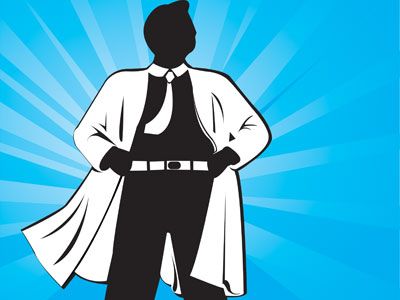
He would never tell a client no, says Jay Kershenstein, hospital manager of VCA University Veterinary Clinic in Fairfax, Va. "If we were triple booked and people were sitting in the lobby, he'd never turn away a client ... ever," Kershenstein says of the late Dr. David Jackson. This is just one of the reasons the single-doctor practice produces loyal clients-many have been making appointments for 25 years-and more than $2 million a year.
When Kershenstein started working with Dr. Jackson 26 years ago as a kennel attendant, he never dreamed he'd one day be the practice manager-or giving the eulogy at Dr. Jackson's funeral. To the devastation of his families, both the one at home and the one in the clinic, Dr. Jackson suffered a stroke and died April 14. Veterinary Economics Practice Management Editor Dr. Ross Clark says Dr. Jackson was the highest-producing non-board-certified veterinarian he'd ever seen-not to mention an all-around awesome guy. Dr. Clark was Dr. Jackson's regional vice president a few years back when National PetCare Centers owned University Veterinary Clinic before VCA Animal Hospitals.
"Dave was always in the front row of my Washington, D.C., seminars. He once arranged an evening dinner with friends who also had an interest in practice management," Dr. Clark says. "The meeting lasted until midnight."
Dr. Jackson's dedication paid off. Dr. Clark says his production was more than twice the next highest-producing veterinarian and at least four times the typical full-time veterinarian. Dr. Jackson saw nearly twice as many cases as other top-producing veterinarians, had a 25 percent higher average transaction charge, and kept his clients ecstatically happy, Dr. Clark says.
We had to find out what made this practitioner so special. Here are eight ways to be a great veterinarian, inspired by Dr. Jackson.
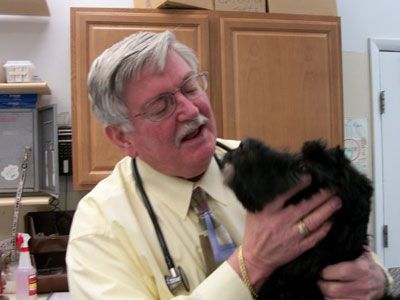
1. Shower clients with cards, coffee, and kindness.
Dr. Jackson (pictured above) wanted clients to be unhappy when it was time to leave the practice because his team had made them feel so good. He taught staff members-especially at the front desk-how to make pet owners feel special the moment their car pulled into the parking lot until the second they drove away, Kershenstein says.
"If it's raining, we take an umbrella out to clients," Kershenstein says. "After the appointment, we carry pet food out to the car for them. We do whatever it takes to impress clients at all times."
It could be as simple as making sure you have every single patient's name right before he or she walks in the door, Kershenstein says. Dr. Jackson took great effort to improve the client experience, from installing a coffee bar in the reception area to creating a card ministry program for clients who deserved to be thanked, congratulated, or consoled-even on non-pet-related issues.
"If Mrs. Smith came in and said, 'My husband just had heart surgery a week ago,' after the client left the room, Dr. Jackson would make a note and give it to the receptionist who excels at making cards," Kershenstein says. "Then a week later, Mrs. Smith would get a card in the mail that said, 'Hey, hope your husband is doing OK.'"
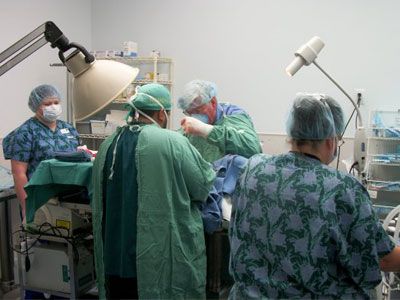
2. Leverage staff.
When VCA employees would visit University Veterinary Clinic, they'd comment, "You guys are always so busy, but every time I see Dr. Jackson, he looks like he has nothing to do." Dr. Jackson worked 10-hour days, six days a week, but he never seemed stressed because he let his team members do their jobs, Kershenstein says.
"He was in charge of recommending the best and shutting up," Kershenstein says. "He let his staff do what we're paying them to do."
Dr. Jackson believed doctors should examine patients, make diagnoses, and perform surgeries-not take X-rays and insert catheters. With more than 15 team members, Dr. Jackson had more people working next to him than any doctor Kershenstein has ever seen.
Every morning began with a "Plan of the Day." This 10-minute meeting gave Dr. Jackson and his team a chance to strategize and figure out their game plan (e.g., "Mary, you take the exam rooms. Mike, call Mrs. Smith right after Max's spay.")
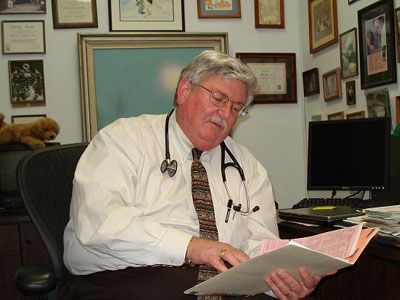
3. Keep the office door open.
As well as being client-centered, Dr. Jackson also valued his team. That's why he implemented an open-door policy and encouraged team members to live up to the sticker on his wall that said, "Always learn."
"He was a mentor and a motivator," says veterinary technician Meredith Laddison. "He encouraged me to further my education and get my veterinary technician license. Unfortunately, he passed away before I could get it, but I know he will be with me all the way. I know how proud he is of me."
Laddison says his open-door policy wasn't just at the clinic. Dr. Jackson gave out his home number to clients for after-hours emergencies. He didn't care what the problem was-he wanted them to call, she says.
"Clients weren't just clients, they were his friends," Laddison says. "He would invite everyone over for Thanksgiving dinners and Super Bowl parties-no matter which team you cheered for."
She says all of the employees felt like a family. Kershenstein says Dr. Jackson was his boss first and foremost but over time transformed into more of a father figure. After all, the two started working together when Kershenstein was 15 years old.
"I got in trouble a few times, shot in the leg with a BB gun, all kinds of fun things," Kershenstein says, now 40. "Dr. Jackson was always there."
He says some people just come to work to work, but Dr. Jackson was actually physically and mentally present every day. Kershenstein says he truly cared about what everybody thought and what kind of mood the staff was in. Did his team appreciate his style? The staff longevity says it all, Kershenstein says.
"There are team members who have been here 10-plus years, and a couple of them are approaching their 20th anniversary with the hospital," Kershenstein says.
4. Compliment-don't criticize.
Technician supervisor Sharyl Mayhew, LVT, says Dr. Jackson taught the University staff not only how to work hard but also how to think. She says Dr. Jackson encouraged team members to challenge assumptions and use their experience to their advantage. Mayhew says Dr. Jackson always told new hires, "There are only two things you need to do here: Use your head and make yourself useful." He welcomed dialogue and encouraged all staff members-from kennel attendants to medically trained team members-to question everything.
"He would never tell team members that they were wrong. Instead he'd teach them how they could be right," Mayhew says.
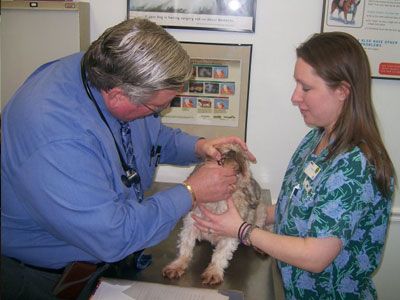
5. Keep patients' memories alive.
Every time a patient passes away at VCA University Veterinary Clinic, the team sends a personally signed card with the Rainbow Bridge poem and a donation in the pet's name to Virginia-Maryland Regional College of Veterinary Medicine at Virginia Tech. The best part? Clients receive a letter from the school informing them that University Veterinary Clinic just made a donation in their pet's honor.
"Clients are so touched by the gesture, they can hardly believe it," Kershenstein says.
6. Appreciate everyone-even the drug reps.
"You know how some drug representatives come in all the time without appointments and expect you to drop everything?" Kershenstein says. "Dr. Jackson developed really close relationships with them."
He would invite them over to his house. A few years back, VCA University Veterinary Clinic even hosted a "drug rep appreciation" lunch.
"All of these representatives were blown away by that," Kershenstein says. "I still hear about it to this day."
Dr. Jackson's hospital also hosts a flu shot clinic for team members and clients and a collection for soldiers. "When you walk in the front door, there's a box where clients can bring shampoos, soaps, books, etc., and we ship them overseas and start a new shipment," Kershenstein says.
7. Know your limits to make less mistakes.
Dr. Jackson opened the practice with his wife, Judy, in 1980. She says they were a team in life and in practice and David gave a new meaning to the term extroversion.
"The model of business that David practiced was to fully empower his staff to learn and grow," Judy says.
While Dr. Jackson was enthusiastic about medicine, after 32 years of practice, he was quick to recognize when a surgery or procedure was out of his area of expertise. In these few instances, Judy says he tracked down the best referrals for his patients. Kershenstein points out that Dr. Jackson had many systems in place to support his weaknesses.
"He wasn't the best record keeper and I think he would admit that," Kershenstein says. "But receptionists and technicians have to make a variety of check marks to make sure every single client makes a follow-up appointment, and reminders are in the system to call clients in X number of weeks, months, or years."
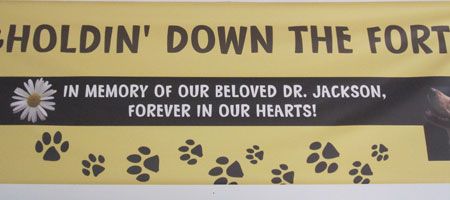
8. Offer only the best.
Dr. Jackson believed that if doctors recommended many different treatment options, veterinary clients would chose the cheapest one. This obviously isn't always the best choice for the patient, which is why he trained his team to only offer the ideal option. He also made sure team members knew what to do in the case of certain symptoms. For example, if a pet comes into the practice with vomiting and diarrhea, they know to recommend blood work and X-rays every time-the client isn't left to decide between options.
That particular strategy was put in place after a client came in with a dog that had been experiencing vomiting and diarrhea for more than a year. She'd taken him to other hospitals, and no doctor could figure out the problem. A quick X-ray at VCA University Veterinary Clinic revealed that the dog had swallowed a sink sponge-no other clinic had X-rayed the sick patient.
After Dr. Jackson passed away, everyone was scared for the future of his clinic and rightly so. However, Kershenstein wasn't worried.
"Was the success of the practice all directly Dr. Jackson? It wasn't just him, it was his system," Kershenstein says. "He laid the foundation. He built the team that keeps people wanting to stick around."
At the end of June, Dr. Greg Swieter became a full-time addition to the VCA University Veterinary Clinic team, and Dr. Kate Gardner became the new medical director in mid-September. As a sign in the hospital lobby says, staff members will continue "holdin' down the fort" for Dr. Jackson and continue to make him proud.
Click the Next button to read an excerpt from the euglogy Kershenstein gave at Dr. Jackson's funeral.
All photos courtesy of Jay Kershenstein
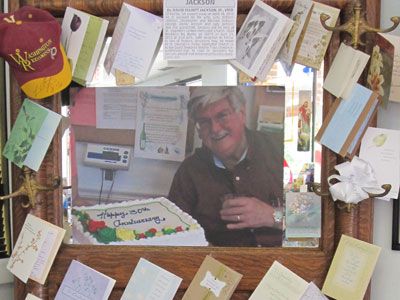
"Hey Doc, I love you man!"
Jay Kershenstein, manager of VCA University Veterinary Clinic, shares an excerpt from the eulogy he gave at Dr. Jackson's funeral:
"A week ago, I could not imagine how I could find joy in any of this. After some time to reflect, I am reminded of a time that Doc and I decided to do a bible study with some of the staff. It only happened once, but I remember it like it was yesterday. We decided to study a book that we both agreed was a favorite: the Book of James. The first verses read, “Consider it pure joy, my brothers, whenever you face trials of many kinds, because you know that the testing of your faith develops perseverance. Perseverance must finish its work so that you may be mature and complete, not lacking anything.”
I consider knowing Doc a pure joy. But the best joy is that I was able to be an apprentice to a true architect-not of structures great and tall, but of great teams. A creator of second families. He had the moral authority to lead people. He believed that we are here to serve others, and that no matter what, the client is why we-as a veterinary team-exist. A special client, Mr. Jones, called me Wednesday and he summed it up best. He said the reason his family drives four times the normal distance to come see us is because Doc created an atmosphere of hospitality. Doc made him feel like he was part of a community. Doc instilled these beliefs in us and we will carry them forward to honor him. I know that I am not the only one in the room who never said this to the great man we call Doc, Dave, David or Dad: “Hey Doc, I love you man! Without you here we will never be the same."
Help keep doc's sprit alive
Dr. David Jackson valued education and after he passed away, his VCA University Veterinary Clinic team members and clients wanted to honor him by setting up a scholarship fund at his alma mater, Virginia-Maryland Regional College of Veterinary Medicine at Virginia Tech. The scholarship will go to a hopeful veterinarian who needs financial aid to attend veterinary school. Want to help out and keep Dr. Jackson's mantra “Always learn” alive? Contact hospital manager Jay Kershenstein (Jay.Kershenstein@vcahospitals.com) to make a donation.